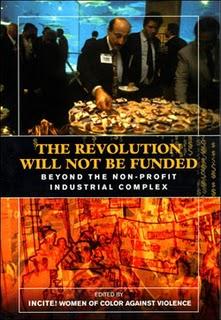The Revolution Will Not Be Funded: Beyond the Non-Profit Industrial Complex

The Color of Violence: The INCITE! Anthology was the first publication that documented some of the concerns and challenges addressed at the Color of Violence Conference, which began at University of California-Santa Cruz in 2000. Since then, there have been two more conferences, organizing campaigns and the SISTERFIRE tour of radical women artists. Now, this collective of women activists and their allies has released The Revolution Will Not Be Funded as their second anthology. This second collection of critical analysis and reflections offers a probing focus on the Non-Profit Industrial Complex (NPIC) and the foundations that determine the agendas of many organizations and movements today.
The book begins by talking about the history of foundations, how foundations often act as tax shelters for wealthy founders and do not necessarily spend a significant amount of their budgets on funding organizations and how the money offered always comes with constraints. These constraints include adhering to a corporate model that starts not only to shift the political agenda of organizations away from research, education and self-empowerment, but these same constraints displace people who are working within these movements because they have not specialized in getting credentials or getting to know people in dominant power structures.
Non-profit organizations—also referred to as non-government organizations (NGOs) here—rely on more and more people who act as liaisons and trained organizers whose motives can be questionable. In spite of all the problems that foundation funding entails, there is a variety of perspectives here that explain what it means to limit accepted funding, to find alternatives to foundation funding and break away from the increasingly professionalized model of activism that relies more heavily on public relations, jargon and social services than addressing the roots of dilemmas rising out of a specific community.
The contributors are thorough in documenting their own experiences with non-profits. Some of them depart from the NPIC structure entirely. Some notable essays include the return to a volunteer staff by Sista ii Sista and how the young women in the organization determined the needs of the group, Madonna Thunder Hawk’s essay on organizing with AIM (American Indian Movement) during the Red Movement and Paul Kivel’s thought-provoking questions in “Social Service or Social Change?” Far from being anti-academic, The Revolution Will Not Be Funded is a well-thought out approach to finding alternatives to a funding system that, in many ways, reinforces the dominant paradigms of class, race, sexism, homophobia and international exploitation. Community activists should read this and ask themselves hard questions and rethink strategic planning.